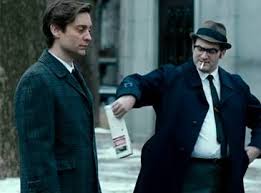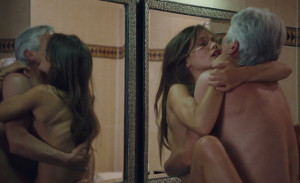Posted: April 24, 2017 | Author: Donald | Filed under: Uncategorized | Tags: Bill Nighy, Eddie Marsan, Ernst Stotzner, François Ozon, Frantz, Gaby Chiappe, Gemma Atherton, Jack Huston, Jeremy Irons, Lissa Evans, Lone Scherfig, Marie Gruber, Paula Beer, Philippe Piazzo, Pierre Niney, Rachel Sterling, Richard E. Grant, Sam Claflin, Their Finest | 543 Comments »

For questions: hcasner@aol.com
First, a word from our sponsors: I am now offering a new service: so much emphasis has been given lately to the importance of the opening of your screenplay, I now offer coverage for the first twenty pages at the cost of $20.00. For those who don’t want to have full coverage on their screenplay at this time, but want to know how well their script is working with the opening pages, this is perfect for you. I’ll help you not lose the reader on page one.
Ever wonder what a reader for a contest or agency thinks when he reads your screenplay? Check out my new e-book published on Amazon: Rantings and Ravings of a Screenplay Reader, including my series of essays, What I Learned Reading for Contests This Year, and my film review
and check out my Script Consultation Services: http://ow.ly/HPxKE
Warning: SPOILERS
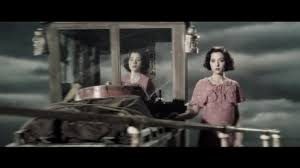 Their Finest is a movie about the making of a movie. But the creation of the film is done under rather extraordinary circumstances.
Their Finest is a movie about the making of a movie. But the creation of the film is done under rather extraordinary circumstances.
First, Hitler is raining bombs down on London during the blitz as the director is calling action.
Second, the film must be made to order and serve a certain propagandistic purpose.
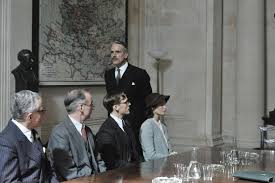 Their Finest, the title taken from a speech by Winston Churchill, opens at a British cinema with the audience watching a clunky and overly earnest film about working women giving their all to meet a war quota. Its intention inspirational, its result comedy unintentional.
Their Finest, the title taken from a speech by Winston Churchill, opens at a British cinema with the audience watching a clunky and overly earnest film about working women giving their all to meet a war quota. Its intention inspirational, its result comedy unintentional.
So the war ministry, headed with a marvelous cameo by Jeremy Irons as the minister, giving a rousing speech as if all involved are about to play rugby, wants a movie that is grounded in reality, but also has a message of hope (a seemingly contradictory request giving the dark days that have descended upon the empire).
Into this project steps one Catrin Cole (Gemma Atherton) who arrives thinking she’s applying for a secretarial position, but leaves as a screenwriter (well, someone has to write the women’s parts). She also leaves with a conflict: is her future to be a dutiful and supportive wife or an independent woman?
Since the movie is being made in 2017, the answer is fairly predictable.
Nevertheless, Their Finest is highly entertaining, never boring and ultimately moving. It’s a slickly made bit of stiff upper lip and the show must go on combined. I can’t see how anyone will be bored.
The most interesting aspect of the story, though, is not Catrin’s arc of mousy to independent, which is fairly standard, but how the movie manages to deal with the various slings and arrows thrown at the filmmakers and how they adapt and make due in trying to please all concerned, the funniest probably being a request from the Roosevelt administration that one of the central characters be an American (though Pearl Harbor has yet to happen). They select a flyer from the U.S. who has joined the RAF and who has become a popular hero. Unfortunately, though his credentials as a hero can hardly be challenged, no one bothered to find out whether his credentials as an actor were equally as good.
There are a couple of ironies here. The first is that the movie they make, The Nancy Starling, inspired by a story of two sisters, twins, who participated in D-Day, is only really surpassed by Their Finest due to technical superiority. In many ways, Their Finest, when all is said and done, may be aesthetically better than the movie within a movie the filmmakers make, but it’s little more than a movie grounded in realism that delivers a message of hope, something that the filmmakers in Their Finest tended to sneer at.
Second, though everyone cheers the idea that this breakout film is filled with working class heroes, the movie that really got everyone’s attention around the time in real life, Mrs. Miniver, is firmly focused on the upper class of the British caste system.
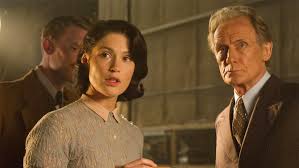 Still, as I said, the movie is highly enjoyable and it’s difficult to dislike anything that has Bill Nighy in it. And here he’s in top form as an aging actor who comes with a slice of ham, a prickly figure who has difficulty coming to terms with the idea that his days of being a matinee idol are over. He has a lovely moment at a gathering where he sings a sentimental song that can’t help but bring tears to the eyes.
Still, as I said, the movie is highly enjoyable and it’s difficult to dislike anything that has Bill Nighy in it. And here he’s in top form as an aging actor who comes with a slice of ham, a prickly figure who has difficulty coming to terms with the idea that his days of being a matinee idol are over. He has a lovely moment at a gathering where he sings a sentimental song that can’t help but bring tears to the eyes.
Also with Eddie Marsan as Nighy’s agent; Sam Claflin (Finnick Odair of The Hunger Games for those so inclined) as a fellow screenwriter and love interest; Jack Huston as Catrin’s cad of a boyfriend; Richard E. Grant as a producer; and Rachel Sterling (of The Detectorists) as a lesbian and assistant to the big bosses.
Gemma Atherton gives a strong performance as Catrin and she holds everything together rather well.
Directed by Lone Scherfig, who helmed the marvelous coming of age film, An Education, but has followed that up with solid, but uninspired fare like One Day. The screenplay is by Gaby Chiappe, one of Britain’s finer television writers, from the book Their Finest Hour and a Half, by Lissa Evans.
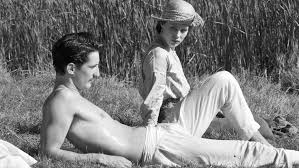 The title character in the new film Frantz is a young man who died in the trenches in World War One. His family is then visited by a Frenchman, Adrien, who claims to have been close friends with Frantz in Paris before the European conflict took place. The trio are at first reluctant to receive him, but as they get to know him, find solace in his memories.
The title character in the new film Frantz is a young man who died in the trenches in World War One. His family is then visited by a Frenchman, Adrien, who claims to have been close friends with Frantz in Paris before the European conflict took place. The trio are at first reluctant to receive him, but as they get to know him, find solace in his memories.
The direction is by Francois Ozon who wrote the screenplay with Philippe Piazzo. It’s inspired by an Ernst Lubitsch film, Broken Lullaby, which was in turn based on a play by Maurice Rostand, the son of Edmond Rostand, who wrote Cyrano de Bergerac.
But as it is in many Ozon films, nothing is quite what it seems and the story is driven by lies and deception, though often of the best intended kind.
Ozon may be a victim of the Hitchcock syndrome here. The master of suspense said he could never make Cinderella because everyone would expect there to be a dead body in the coach.
Ozon, in turn, has made many a film with gay central characters. So when Adrien claims to know Frantz, it seems as if he’s talking about in the Biblical way. It’s Ozon, what else could it mean?
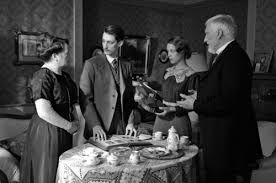 Well, something entirely different here and when the secret is revealed, it’s actually kind of a let down and a disappointment. The movie then takes some curious and not entirely uninteresting turns as it tries to decide if in life fantasy at times is more beneficial than truth. But it never really recovers from that central revelation.
Well, something entirely different here and when the secret is revealed, it’s actually kind of a let down and a disappointment. The movie then takes some curious and not entirely uninteresting turns as it tries to decide if in life fantasy at times is more beneficial than truth. But it never really recovers from that central revelation.
But I actually think there is a more serious problem and that is in the casting of Pierre Niney as Adrian. Actually, it’s not exactly the casting of the actor, but the casting of his mustache which, though popular at the time, is probably one of the more disastrous hirsute choices in film.
 For Niney, scrawny and large eyed as he is, the mustache makes him look like a young Salvador Dali, and is so distracting, it’s hard to take the character seriously. And then as time goes on, and Frantz’s fiancée Anna comes to look on him as a possible love interest, he has become something of a ninny such that rather than be unhappy when her love is not reciprocated, you feel as if she just dodged a bullet.
For Niney, scrawny and large eyed as he is, the mustache makes him look like a young Salvador Dali, and is so distracting, it’s hard to take the character seriously. And then as time goes on, and Frantz’s fiancée Anna comes to look on him as a possible love interest, he has become something of a ninny such that rather than be unhappy when her love is not reciprocated, you feel as if she just dodged a bullet.
With Paula Beer as Anna, Ernst Stotzner as Frantz’s father and Marie Gruber as his mother.
Posted: April 27, 2013 | Author: Donald | Filed under: Uncategorized | Tags: Ben Affleck, Emmanuel Lubezki, Ernst Umhauer, Frabrice Luchini, François Ozon, In the House, Javier Bardem, Jeff Nichols, Kirsten Scott Thomas, Matthew McConaughey, Michael Shannon, Mud, Olga Kurylenko, Philippe Rombi, Rachel McAdams, Reese Witherspoon, Sam Shepard, Terence Malick, To the Wonder, Tye Sheridan, Yolando Moreau | 4 Comments »
In the House, the new film from writer/director François Ozon, is a movie where you wait an hour and forty-five minutes for the other shoe to drop…and it never does.
The basic premise revolves around Germain, a somewhat bitter high school teacher, who assigns his literature class an essay about what they did over the weekend. The results are depressingly high schoolish until he reads one from student Claude who writes about his attempts to insinuate himself into the household of a fellow student who has an ideal, Andy Hardy/Donna Reed middle class home. The essay is condescending and laced with wry observations, but it shows talent. It also ends with “(to be continued)”. As the film goes on, Claude gets inside that household and writes more and more (to be continued) essays until Germain is so hooked that he not only spends extra time with Claude, he also helps him in ways that will come back to bite him in the ass.
The movie starts out well and even makes your mouth water at the possibilities here. Just what is this Claude up to? And why is he involving Germain? But alas, these are the shoes that never drop. And as the story continues, often backed by a thrilling music score by Philippe Rombi that makes you think something exciting is transpiring on screen even when it isn’t, the more and more puzzling the whole thing becomes. Not only do we never find out exactly what is going on, it kind of ends with the idea that nothing was ever going on at all in the first place. But if so, then what was the point of it all?
Equally puzzling, and I think one of the major problems with the movie, is that as Claude continues on with his soap operic observations of this family, the better Germain (as well as his wife who also starts reading the essays) thinks Claude’s writing and story is becoming, when in actuality, the less and less interesting, the more banal, boring and clichéd, it turns out to be. Let’s face it, Claude was never going to be mistaken for Proust, but still it’s just difficult to believe that Germain continues to have such a high opinion of his student the more he reads. Even more puzzling is that as the essays pile up, the more obvious it is that Claude is at times just making things up (if he’s not, then he’s even a worse writer than he appears). But this never seems to dawn on Germain, perhaps the most unbelievable aspect of the film.
It must be said that though the actors never quite sell the premise and plot turns, their performances are still first rate. Frabrice Luchini, a character actor with a face that Walter Mathau would be proud of, plays Germain with a certain hang dog loopiness. Kirsten Scott Thomas plays his wife and it’s one of her sharpest performances. Ernst Umhauer is Claude with a smile just this side of Damien in The Omen. Also in a blink or you’ll miss it cameo is Yolando Moreau, proof that even in France, as over here, if you win the equivalent of the Oscar for Best Actress but don’t look like Catherine Deneuve, you’ll still be stuck having to play parts insultingly unworthy of you.
The conversation I had with my friends after seeing Mud, the new Matthew McConaughey vehicle by writer/director Jeff Nichols (who also gave us Take Shelter and Shotgun Stories), went something like this: Them: “What did you think”, Me: “I think it moved a little leisurely”, Them: “A little?”, Me: “All right. It was as slow as molasses”, Them: “Thank you”.
Yes, Mud is not the most forward momentum of movies. And in a way that’s rather surprising given the basic subject matter. Ellis, a young teen, and his best friend go look at a boat that has lodged in a tree after a recent flood, but discover that someone is living there, the title character Mud, who is in town to rescue the woman he loves and take her away before he is killed by the bounty hunters hired by the father of the woman’s boyfriend Mud killed after the boyfriend beat up the woman. Sounds pretty much like a ticking time bomb of a premise to me, but the movie tends to get diverted along the way with the teen’s problems with his parents who are drifting apart and his attempt to win the heart of a girl who is out of his league, until the tension all gets a bit waterlogged since Nichols just can’t get as much energy flowing for his other through lines as he does for the one concerning Mud.
But there’s also something else missing from the heart of this movie. One of the major leit motifs here is that Mud is constantly described as a liar and nothing remotely as he presents himself. The woman he loves says it; his substitute father figure says it; even Mud says it, until at one point even Ellis himself screams it at him. Yet, oddly enough, the one thing that Mud never does is lie. Everything he tells Ellis is pretty much exactly on the level with not one whiff of misrepresentation. Well, that’s not exactly accurate. Mud does tell a whopper once. When Ellis yells out at him that women aren’t worth loving, Mud tells him that’s not true. Except that within the context of the movie, Ellis is right and Mud is lying. All the women in the movie do nothing but declare their love for a man, then stab him in the back. I suppose that Nichols might be saying that the nobility of the male of the species resides in the tragedy of their continual decision to fall in love in spite of how unworthy their beloveds are. Still, it all seems a bit odd to me.
The point, though, is that this sort of throws Ellis’s journey off a bit. The audience is being set up for Ellis to learn some big secret about Mud, a lie that will change Ellis forever and help him on his journey to adulthood as is the wont of coming of age films. But there is no secret. It’s all a red herring. And Ellis learns something about life, but it has little to do with the title character.
The movie is lovely to look at with languorous vistas of sunsets and open waters and there’s a nice feel for small town life. It has a slam bang climax that’s not that believable, but is incredibly satisfying emotionally. The acting is solid, though it’s Sam Shepard as the father figure who gives the most interesting performance. Tye Sheridan as Ellis is capable. And McConaughey does his McConaughey thing, though this time he only strips down to his bare chest. Oh, yeah, uh, Reese Witherspoon and Michael Shannon are in it, too.
Tortuous. I’m sorry, but I don’t know how else to say it. Writer/director Terence Malick’s new film To the Wonder is…tortuous. Directed/filmed/edited in the same style employed for the central section of his last film The Tree of Life, a series of quick glimpses and expressionistic scenes, To the Wonder starts out somewhat hypnotically with gorgeous cinematography by Emmanuel Lubezki. But it’s not long before one quickly realizes that there ain’t a lot going on here and what there is, isn’t that original or interesting. In fact, the best way to summarize it might be to say that there seems to be some sort of story here, but Malick is desperately determined not to tell it. It concerns a man’s relationship with two woman, one a French citizen he brings to America with her child and whom he grows tired of, the second an old flame that he has a fling with and whom he grows tired of. As the film goes on it begins to resemble more and more a classical music video that one might find on a PBS station after its daily schedule is over. And the aesthetic approach, the snippets of scenes sewn together with a somewhat impressionistic, improvisational feel, seems as if it’s not there to bring more insight and depth to the relationships semi-dramatized in the movie, but chosen to cover up the idea that there’s really nothing of interest going on. The characters are played by Ben Affleck and Olga Kurylenko (who seem to spend much of their time quietly avoiding each other while living in a house they can never seem to finish and is filled with boxes and suitcases that are never fully unpacked—I think this is what is called symbolic), with Rachel McAdams as the old girlfriend and Javier Bardem as a rather unimpressive priest who does little but walk around in existential agony, though not in as much existential agony as I was in watching the movie.
Tell me what you think.
 Their Finest is a movie about the making of a movie. But the creation of the film is done under rather extraordinary circumstances.
Their Finest is a movie about the making of a movie. But the creation of the film is done under rather extraordinary circumstances. Their Finest, the title taken from a speech by Winston Churchill, opens at a British cinema with the audience watching a clunky and overly earnest film about working women giving their all to meet a war quota. Its intention inspirational, its result comedy unintentional.
Their Finest, the title taken from a speech by Winston Churchill, opens at a British cinema with the audience watching a clunky and overly earnest film about working women giving their all to meet a war quota. Its intention inspirational, its result comedy unintentional. Still, as I said, the movie is highly enjoyable and it’s difficult to dislike anything that has Bill Nighy in it. And here he’s in top form as an aging actor who comes with a slice of ham, a prickly figure who has difficulty coming to terms with the idea that his days of being a matinee idol are over. He has a lovely moment at a gathering where he sings a sentimental song that can’t help but bring tears to the eyes.
Still, as I said, the movie is highly enjoyable and it’s difficult to dislike anything that has Bill Nighy in it. And here he’s in top form as an aging actor who comes with a slice of ham, a prickly figure who has difficulty coming to terms with the idea that his days of being a matinee idol are over. He has a lovely moment at a gathering where he sings a sentimental song that can’t help but bring tears to the eyes. The title character in the new film Frantz is a young man who died in the trenches in World War One. His family is then visited by a Frenchman, Adrien, who claims to have been close friends with Frantz in Paris before the European conflict took place. The trio are at first reluctant to receive him, but as they get to know him, find solace in his memories.
The title character in the new film Frantz is a young man who died in the trenches in World War One. His family is then visited by a Frenchman, Adrien, who claims to have been close friends with Frantz in Paris before the European conflict took place. The trio are at first reluctant to receive him, but as they get to know him, find solace in his memories. Well, something entirely different here and when the secret is revealed, it’s actually kind of a let down and a disappointment. The movie then takes some curious and not entirely uninteresting turns as it tries to decide if in life fantasy at times is more beneficial than truth. But it never really recovers from that central revelation.
Well, something entirely different here and when the secret is revealed, it’s actually kind of a let down and a disappointment. The movie then takes some curious and not entirely uninteresting turns as it tries to decide if in life fantasy at times is more beneficial than truth. But it never really recovers from that central revelation. For Niney, scrawny and large eyed as he is, the mustache makes him look like a young Salvador Dali, and is so distracting, it’s hard to take the character seriously. And then as time goes on, and Frantz’s fiancée Anna comes to look on him as a possible love interest, he has become something of a ninny such that rather than be unhappy when her love is not reciprocated, you feel as if she just dodged a bullet.
For Niney, scrawny and large eyed as he is, the mustache makes him look like a young Salvador Dali, and is so distracting, it’s hard to take the character seriously. And then as time goes on, and Frantz’s fiancée Anna comes to look on him as a possible love interest, he has become something of a ninny such that rather than be unhappy when her love is not reciprocated, you feel as if she just dodged a bullet.










